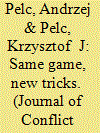| Srl | Item |
| 1 |
ID:
144788


|
|
|
|
|
| Summary/Abstract |
This paper considers evolutionarily stable decisions about whether to initiate violent conflict rather than accepting a peaceful sharing outcome. Focusing on small sets of players such as countries in a geographically confined area, we use the concept of evolutionary stability in finite populations. We find that players’ evolutionarily stable preferences widen the range of peaceful resource allocations that are rejected in favor of violent conflict, compared to the Nash equilibrium outcomes. Relative advantages in fighting strength are reflected in the equilibrium set of peaceful resource allocations.
|
|
|
|
|
|
|
|
|
|
|
|
|
|
|
|
| 2 |
ID:
091616


|
|
|
|
|
| Publication |
2009.
|
| Summary/Abstract |
The aim of this article is to distinguish between strategies in the Iterated Prisoner's Dilemma on the basis of their relative performance in a given population set. We first define a natural order on such strategies that disregards isolated disturbances, by using the limit of time-average payoffs. This order allows us to consider one strategy as strictly better than another in some population of strategies. We then determine a strategy-to be ''robust,'' if in any population consisting of copies of two types of strategies, itself and some other strategy - the strategy - is never worse than. We present a large class of such robust strategies. Strikingly, robustness can accommodate an arbitrary level of generosity, conditional on the strength of subsequent retaliation; and it does not require symmetric retaliation. Taken together, these findings allow us to design strategies that significantly lessen the problem of noise, without forsaking performance. Finally, we show that no strategy exhibits robustness in all population sets of three or more strategy types.
|
|
|
|
|
|
|
|
|
|
|
|
|
|
|
|